Farmer of the Month: Abby Schilling of Mick Klüg Farms
- By Lex Flamm
- Reading Time: 5 mins.
“So, a social worker, a farmer, an engineer, and a salesman walk into a bar…”
That sounds like the beginning of a cheesy joke, but if you swap the word “farm” in for “bar,” it’s pretty close to the story of how Abby Schilling purchased Mick Klüg Farms from her father, Mick Klüg, seven years ago.
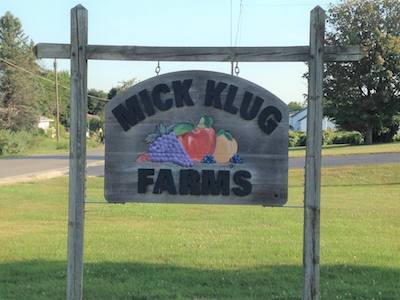
From Farmer to Social Worker, to Farmer Again
Abby grew up on the farm in Saint Joseph, Michigan, and she used to be a Klüg (pronounced kl-OO-g) herself. She spent her childhood selling peaches, blueberries, and zucchini at Chicago farmers’ markets. Then, she left farming behind for a career in social work—at least for a little while. In 2017, the Klügs decided to pass the farm to the next generation, and Abby headed home.
“Farming, I have found, has a lot of social work involved,” she told The FruitGuys this spring. “… It’s really about the relationships you form throughout the agriculture community.”
In our “walk into a bar” joke, Abby is the social worker—although she’s also a third-generation farmer. Her husband Mark Schilling is the farmer, her sister-in-law Bae Schilling is the engineer, and Mark’s brother Ben Schilling is the salesman.
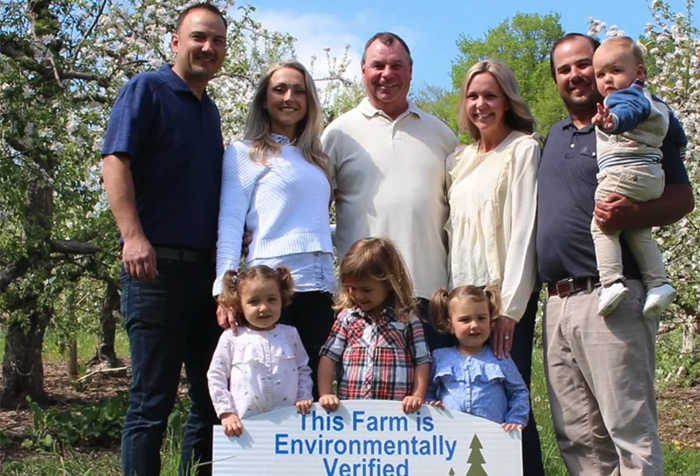
Today, the four of them co-own Mick Klüg Farms, growing cherries, blueberries, apricots, asparagus, peaches, sweet peas, tomatoes, raspberries, melons, plums, grapes, and more. Abby and Bae are the majority owners, and the farm’s women-owned status means a lot to Abby, given her family history.
Women-Owned at Last: Raise a Trowel to Grandma Clara
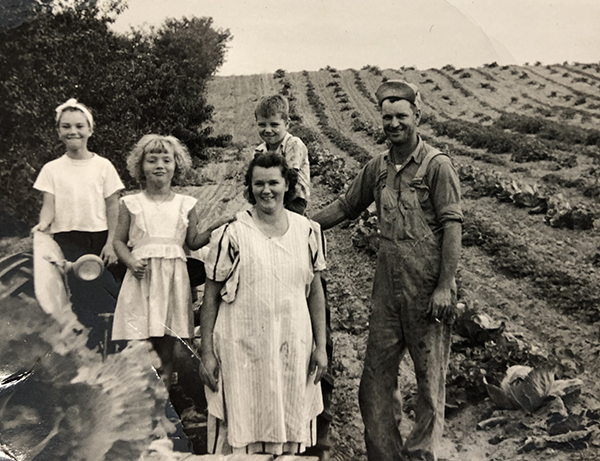
Mick Klüg Farms is truly a family farm. In the 1930s, Mick’s parents purchased 40 acres of farmland in Saint Joseph. They both worked the land, but because of the era, Mick’s father got all of the credit.
“My grandma, Clara, did just as much work as my grandfather, if not more, and she also took care of six children,” Abby said. “The joke is that my dad was born in the cherry orchard. He wasn’t, but she never really ever stopped working [after he was born]. She played a huge part. I think if she were around today, she would be really happy to see that her granddaughter and granddaughter-in-law are getting the credit that she very much deserved.”
Abby and Bae told The FruitGuys that in 2024, things are different for women farmers than they were in the ‘30s.

“I think people might assume that we’re treated differently, but we’re not. Our male counterparts and older men in the industry have a lot of respect for the fact that we are taking it on full-force. That has been really interesting to see and also just reinstates the importance of what we do and of being leaders within the industry,” Abby said.
Bae came to farming after working as a scientist, engineer, and nonprofit business director. She said that things were tough as a woman in some of those male-dominated fields, but she hasn’t had the same obstacles in farming.
“As long as you have something valid to say, you put out a good product, and you respect the people you’re working with and that work for you, [other farmers will respect you, too],” she said.
Farming in Michigan’s ‘Fruit Belt’
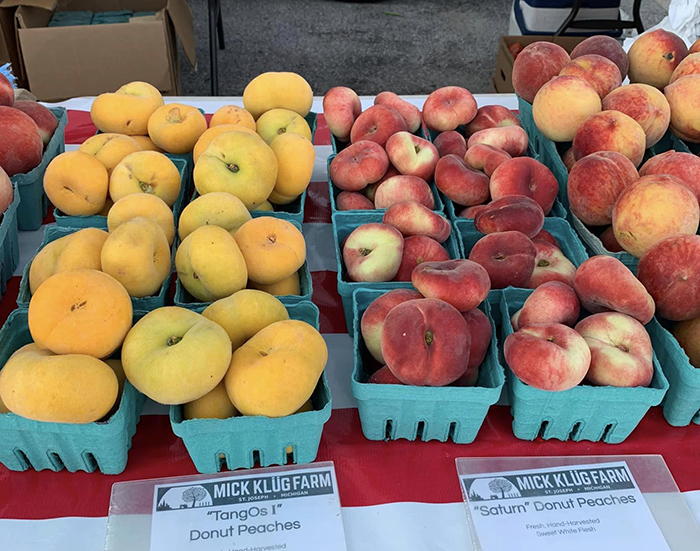
Mick Klüg Farms spans 120 acres of Michigan’s “Fruit Belt,” which stretches north to south along the coast of Lake Michigan.
“It’s this microclimate along the shoreline that has very fertile soil due to Lake Michigan, as well as the lake providing a buffer for extreme cold temperatures in the winter so we’re not getting quite as cold as the middle of the state,” Abby explains. “In the summer it has the opposite effect—we aren’t getting quite as hot.”
Thanks to that rich soil and temperate climate, Mick Klüg Farms produces almost too many fruits and vegetables to name, including veggies like asparagus, and fruits like cherries, raspberries, and grapes. They sell their bounty at farmer’s markets and in FruitGuys fresh fruit delivery boxes. Mick and Abby have worked with The FruitGuys since 2000, and we look forward to their berries and stone fruit every summer.
The Schillings make an effort to farm sustainably. Mick Klüg Farms is environmentally verified by the Michigan Agriculture Environmental Assurance Program (MAEAP) for its efforts to prevent agricultural pollution. Every crop is hand-harvested, and if Abby had to pick just three words to describe their work, she’d choose “busy, unpredictable, and rewarding.”
A Rollercoaster Summer Season at Mick Klüg Farms
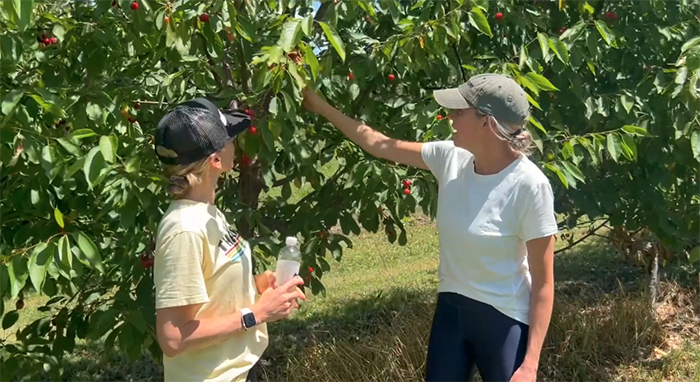
This year, the word “unpredictable” turned out to be an accurate one. When The FruitGuys spoke to Abby and Bae in early June, they’d just lost their entire apricot crop to a late frost.
“That is a bummer but that’s okay, that’s farming,” Abby said. “Raising apricots in Michigan is very challenging, and we typically only get a great crop every five years or so.”
Luckily, the farm’s cherry season was booming. It kicked off earlier than usual in June with sweet-tart Jubileum cherries and tart Montmorency and Balaton cherry varieties. Sweet cherries like Cavalier, Regina, and Black Pearl were hot on their heels. Abby and Bae were also excited about their upcoming blueberry, peach, and raspberry crops.
“Everything’s early due to the warm winter and warm spring. … The start date of blueberries historically has been around July 4, but I think we’re going to start [picking] Monday, June 17. It’s a record-breaking year for blueberries in terms of start date,” Abby said.
In early June, she and Bae were already looking forward to their favorite peach varieties, like the Glenglo (a sweet and juicy early-season peach) and Autumnstar (a large, slightly tart, late-season peach). The Mick Klüg team plants dozens of varieties so they can extend each fruit’s season. This year, they hope to have cherries through July and peaches and blueberries through August.
“Whenever people ask me how the season’s going, my response tends to be, ‘Everything we can control is going well,’” Bae said.
To learn more about the history of Mick Klüg Farms, check out this interview with Abby’s father, Mick Klüg.


